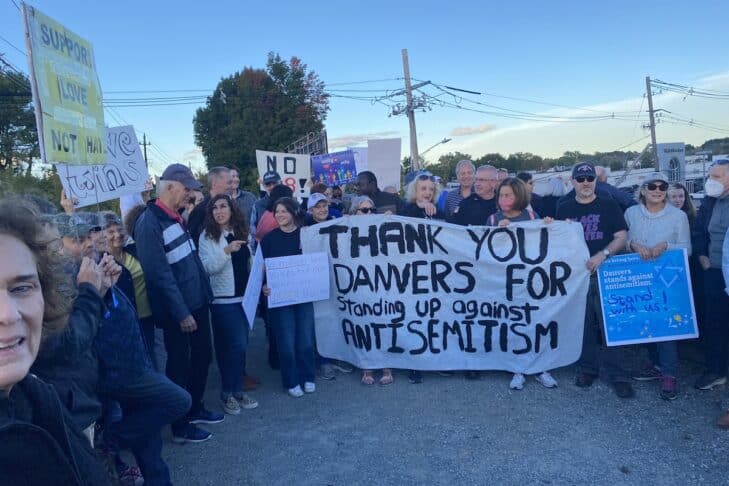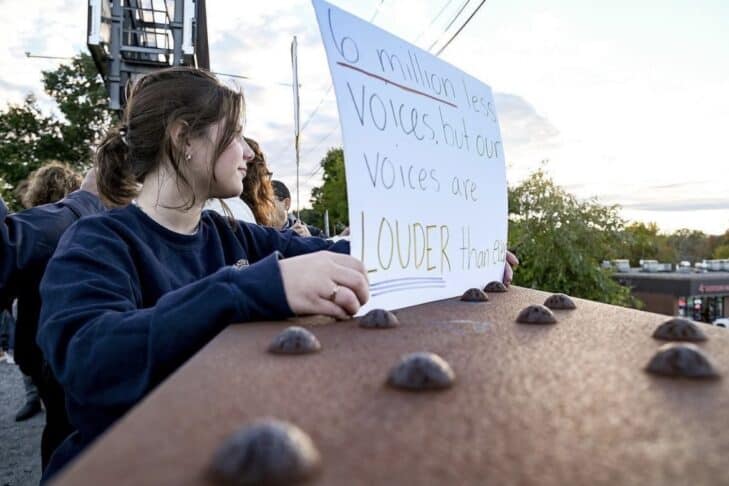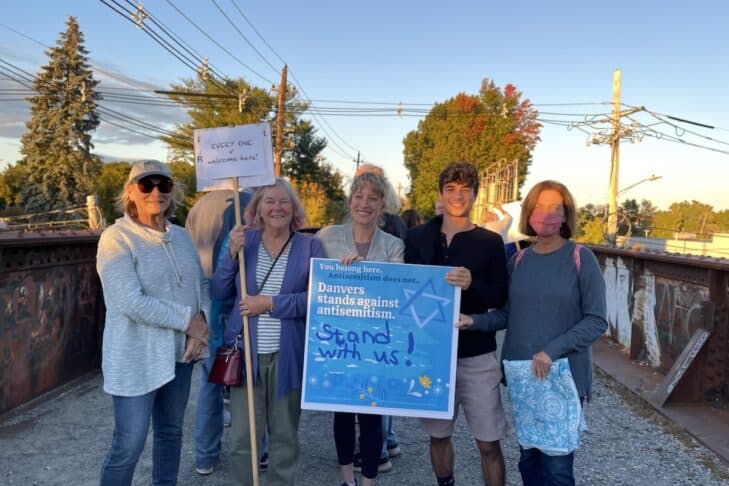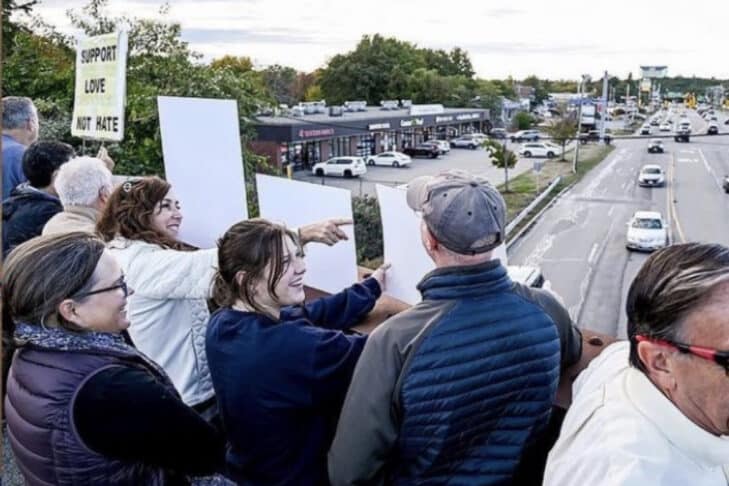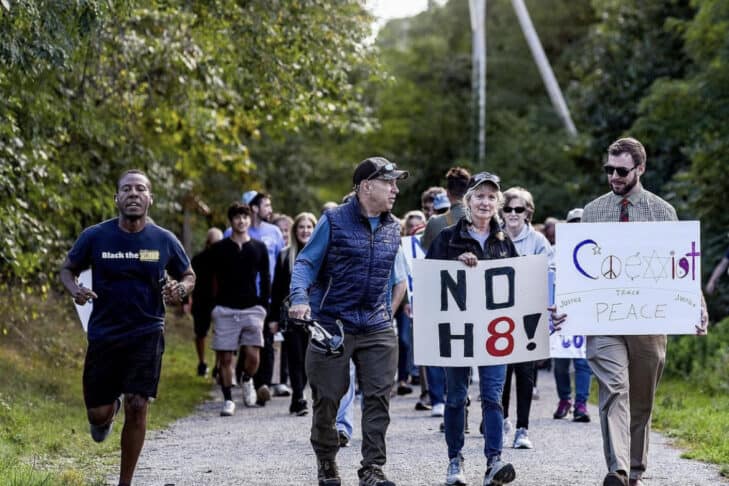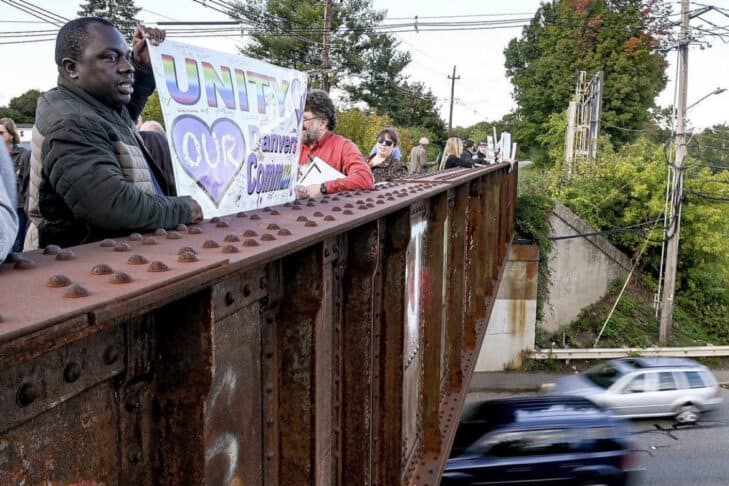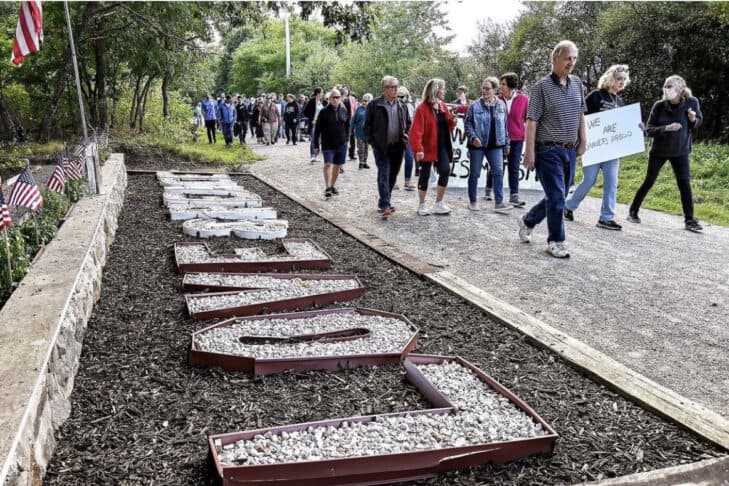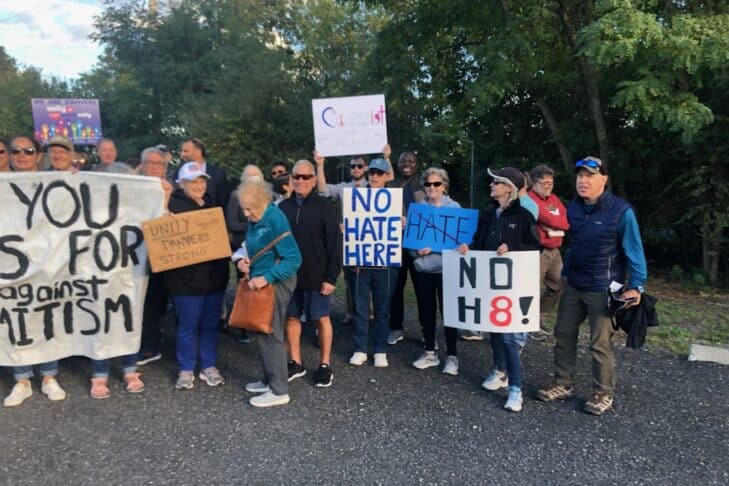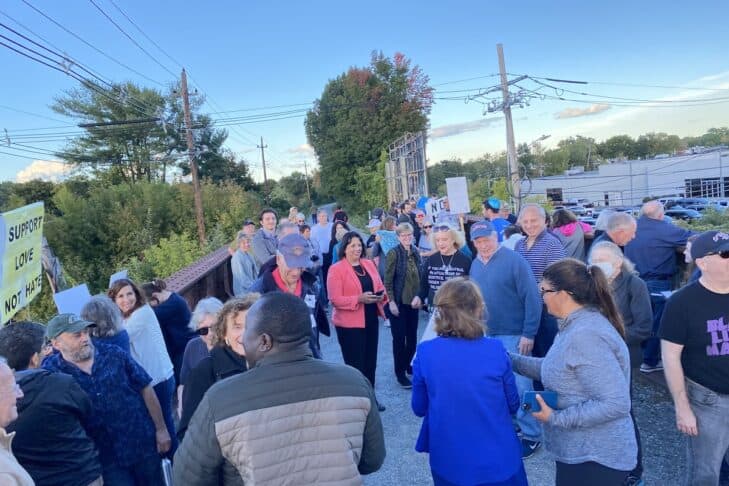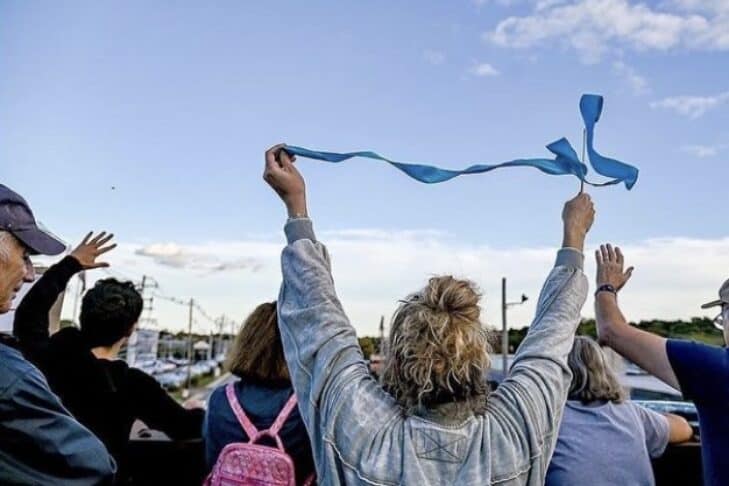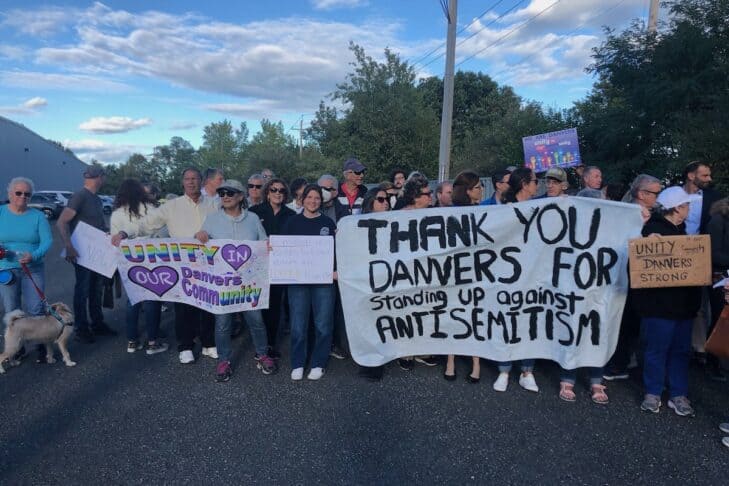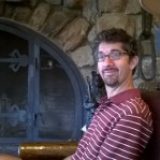After antisemitic and racist messages were publicly displayed along roadways on the North Shore last month, community members held multiple events to protest such hate.
The most recent event took place last Wednesday in Danvers—a quarter-mile march to an overpass on Route 114. There were an estimated 80-100 participants, with some displaying signs bearing positive messages such as “No Hate Here.”
“It was very welcoming,” said Norah Hass, an 11th-grader at Danvers High School, who attended with her father, Michael Hass. “It was for a good cause. Everyone wanted to say the same thing—stop the hatred.”

North Shore communities came together in response to hateful messages displayed in the area on Sept. 11, the 21st anniversary of the 2001 terror attacks. According to a media report, on Route 1 in Saugus that day, three masked individuals atop an overpass displayed a banner with the words “Jews Did 9/11,” while on Route 114 in Danvers, another banner contained the message “Defend White Communities.” Members of an organization called the Nationalist Social Club (NSC-131) claimed responsibility; the Anti-Defamation League describes NSC-131 as a neo-Nazi group.
Three days later, on Sept. 14, Chabad of the North Shore spearheaded a “No Place for Hate” event at Saugus Town Hall. The following week, on Sept. 19, the Town of Danvers held a “Community Conversation” to discuss the hateful messages.
“I feel like the high-profile nature and the visibility, in particular…of this act of antisemitism…struck a nerve with a lot of people that were looking to come together and express their condemnation,” said Rabbi Yossi Lipsker of Chabad of the North Shore. “And we simply created an outlet for that. The outpouring of support from elected officials from throughout the area was heartwarming, to say the least.”
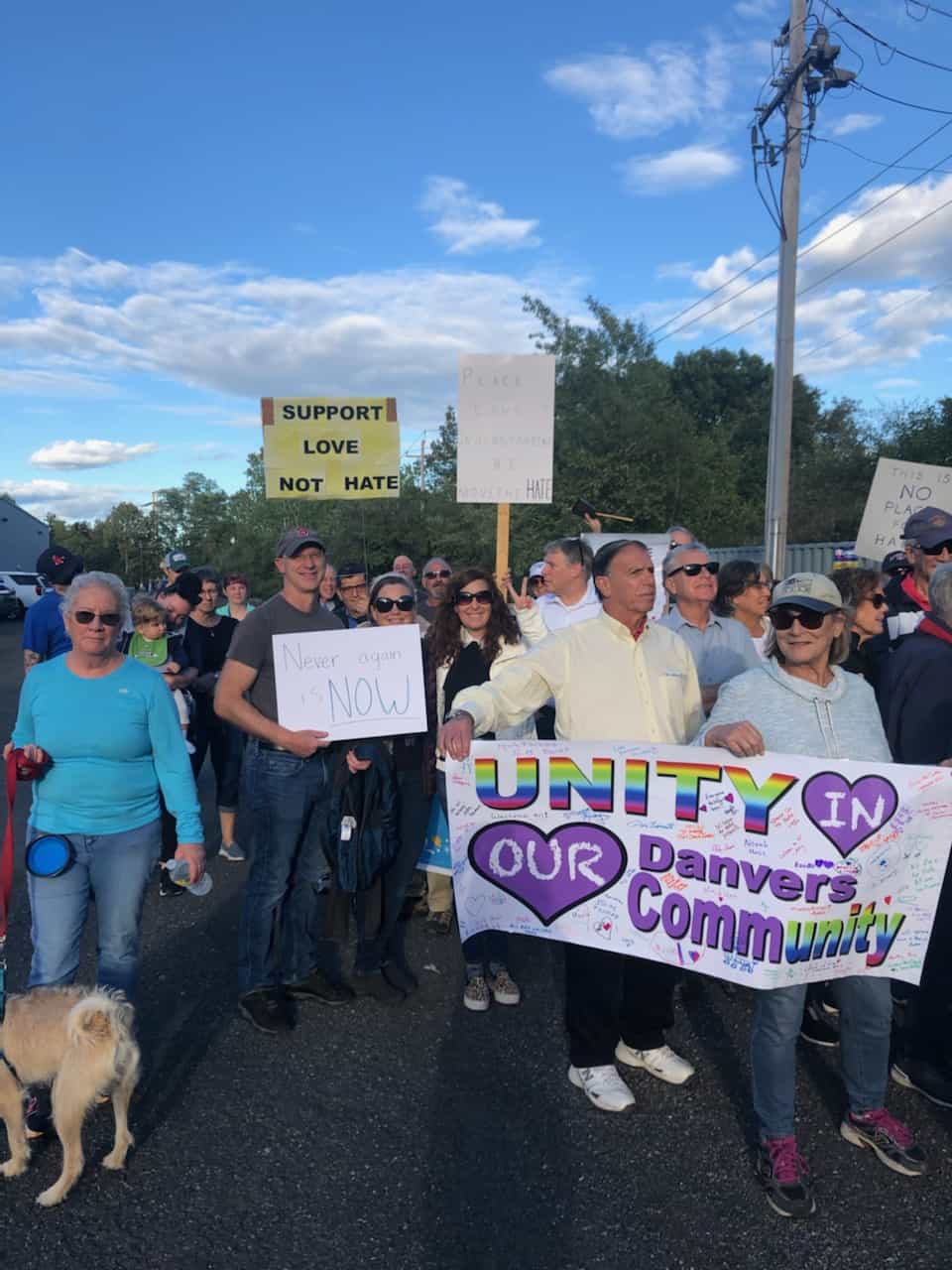
One attendee of the Saugus event—Rabbi Nechemia Schusterman of Chabad of Peabody, who read Psalm 20—noted a common theme from people’s remarks.
“We’re not going to be cowering in silence or fear, but if anything, dig deeper, be more brave, about our Judaism,” Schusterman said.
Deborah Coltin, executive director of the Lappin Foundation, made a suggestion at the community conversation in Danvers.
“They invited the community to gather, talk about what happened, how people were feeling, and what could they do beyond coming together and calling it out—what more could we do,” Coltin said. “I proposed we could reclaim the bridge—don’t let hate speech find a life of its own.”
On Sept. 28, around 100 people gathered in the parking lot of Danvers Indoor Sports for the quarter-mile walk along a rail trail to the Route 114 overpass.
“It was a beautiful moment to witness what happens when our residents feel empowered to reclaim this town as they stand up and come together,” said Jasmine Ramón, director of equity and inclusion for the Town of Danvers.

Coltin was among those who delivered opening remarks.
“I complimented Danvers on the progress it has made,” said Coltin, citing a 2021 Lappin Foundation initiative in the town in response to previous incidents of antisemitism.
“It’s really about investing time, showing up, forming relationships,” Coltin said, noting that proactive responses to hate are “not limited to antisemitism but all kinds of hatred that show up” and that the community as a whole must “be there for each other.”
Michael Hass and his daughter carried two signs they displayed from the overpass: “Never again is NOW” and “6 million less voices, but our voices are LOUDER than ever.”
“People driving by were honking their horns,” Michael Hass said. “They were very supportive of the messages.”

The marchers included Rabbi Michael Ragozin of Congregation Shirat Hayam of the North Shore in Swampscott.
“Antisemitism does not have town boundaries,” Ragozin said. “It was important to show up…treat antisemitism as not just a Jewish issue but a communal issue.” And, he added, “I feel it’s important to show up for a public demonstration.”
Asked about the content of the messages that prompted the community response, he replied, “Antisemitism, at its core, is often irrational. There was a degree of shock and surprise that hit me…as well as, how disturbing is it, this trope of blaming the Jews for something catastrophic…and how that pattern of blaming the Jews for real-world catastrophes is an ongoing antisemitic trope, Jews being blamed for COVID, Jews being blamed for 9/11, etc. I find that offensive and disturbing.”
However, he said that the hateful banners “didn’t stand for our community, and the community didn’t tolerate it. We stood up to antisemitism and hate speech.”

Chabad’s Lipsker and the Lappin Foundation’s Coltin each mentioned encouraging developments that have come out of the community responses. According to Lipsker, the Saugus Board of Selectmen will participate in a joint initiative with Chabad of the North Shore—a public menorah on Chanukah. The Lappin Foundation, meanwhile, is planning a rapid-response group for any future hateful acts, as well as a summit on antisemitism scheduled for next month.
“I think [the Sept. 28 event] is an example of what you can do,” Coltin said. “A place that had been tarnished by hate, get together to reclaim that space, number one. And education is key. Here, the community has already scheduled an educational program about antisemitism, what it is, why it’s still here, what does it look like and sound like today?”
She described herself as “grateful—I can speak for the Lappin Foundation—to have a community, to have Danvers so invested in the ‘what’s next’ piece. So many of these gatherings come together and call it out, but it’s important to never let this be normalized. Danvers has invested time, energy and resources into ‘what else can we do.’ I think that’s also really important.”


